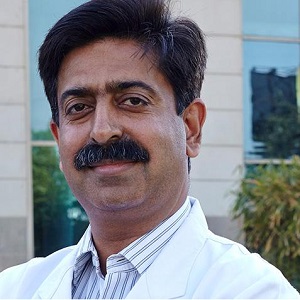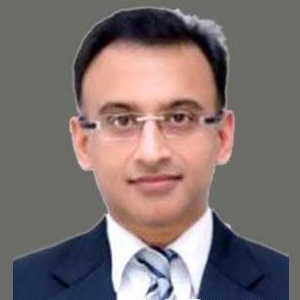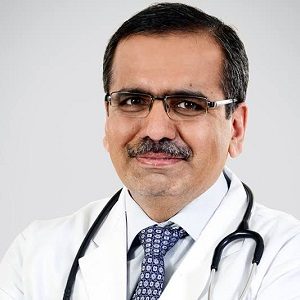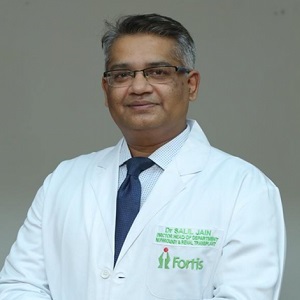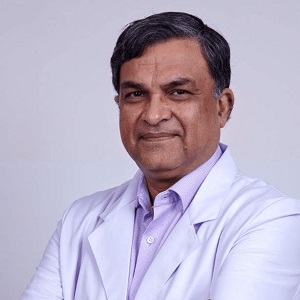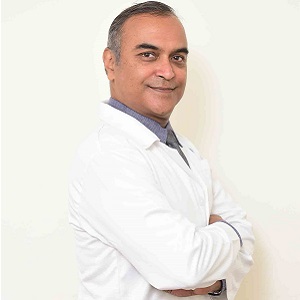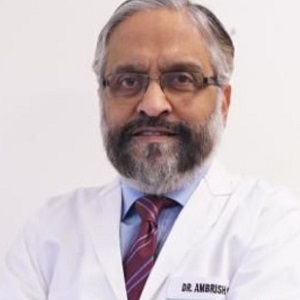Best Doctors in India for Alcoholic Hepatitis Treatment
- Rheumatologist, New Delhi, India
- Over 35 years’ experience
Profile Highlights:
- Dr. Rohini Handa is one of the best Rheumatologists in India.
- He offers treatment for Rheumatic Arthritis, Systemic Lupus Erythematosus (SLE), and Paget’s disease.
- He has received many prestigious awards and orations.
- Dr. Handa has written/co-written more than 335 papers, chapters, and review articles for national and international journals.
- Ophthalmologist, Eye Surgeon, Gurugram, India
- Over 18 years’ experience
Profile Highlights:
- Dr. Neeraj Sanduja is a well-trained Ophthalmologist, with huge experience in the management of vitreoretinal conditions.
- He is known to perform around 60 FFA and 75 Lasers treatments in OPD in a month. He is actively involved in ROP screening and treatment awareness programs.
- His previous experience includes a stint at William Beaumont Hospital, Michigan, the USA as a Visiting Fellow in Paediatric Retina.
- Surgical Oncologist, New Delhi, India
- Over 40 years’ experience
Profile Highlights:
- Dr. Ramesh Sarin is one of the best surgical oncologists in India, with a mammoth experience of 49 years.
- Furthermore, the veteran oncologist focuses on managing breast cancer and related disorders like sentinel node biopsy.
- She is also interested in Phyaryngeal Cancer, Uterine Cancer, Bladder Cancer, Cervical Cancer, Liver Cancer, Fallopian Tube Cancer, Bone Cancer, Lung Cancer, Colon and Rectal Cancer, Lymphedema, and Brain Cancer.
- Dentist and Dental Surgeon, New Delhi, India
- Over 21 years’ experience
Profile Highlights:
- Dr. Adosh Lall is one of the best dentists in India. He is having an experience of over 21 years.
- He has been involved in imparting education to graduate and postgraduate students for 14 years. Also, he is an examiner of postgraduate students in India and Nepal.
- Dr. Adosh Lall has treated innumerable patients successfully in his past years as a dentist.
- Medical Gastroenterologist and Hepatologist, New Delhi, India
- Over 30 years experience
Profile Highlights:
- Dr. Yogesh Batra is one of the best medical gastroenterologists in New Delhi, India.
- Dr. Batra specializes in therapeutic endoscopy (EUS, ERCP), hepatology, pancreatic disease, and inflammatory bowel disease (IBD). He has successfully performed a variety of diagnostic and therapeutic GI procedures on hundreds of patients throughout his career.
- Nephrologist, Gurugram, India
- Over 21 years’ experience
Profile Highlights:
- Dr. Salil Jain is considered one of the best nephrologists in Gurugram and the Delhi region.
- He is the director of the Department of Nephrology at Fortis Memorial Research Institute, Gurugram, and has more than 21 years of experience.
- Dr. Salil Jain is an exceptional clinician having several national and international publications to his credit.
- Bariatric & Laparoscopic Surgeon, Gurugram, India
- Over 40 years’ experience
Profile Highlights:
- Dr. Ajay Kumar Kriplani has the credit of being the first in India to perform laparoscopic adrenalectomy and laparoscopic splenectomy and performing the first laparoscopic Whipple’s pancreaticoduodenectomy in North India and he is one of the best laparoscopic surgeons in Delhi and Gurugram.
- Dr. Kriplani has been invited as a faculty for 395 live demonstrations, Guest lectures, orations, and keynote addresses at conferences in various Indian cities and outside India e.g. Rome, Hongkong, Kualalumpur, Singapore, Tashkent, Dubai, Kathmandu, Dhaka, etc.
- Bariatric & Laparoscopic Surgeon, New Delhi, India
- Over 35 years’ experience
Profile Highlights:
- Dr. Arun Prasad is one of the world’s finest Bariatric & Laparoscopic surgeons having an experience of over 7000 laparoscopic operations.
- Dr. Prasad has done the world’s first Laparoscopic operation on the Gall Bladder fistula with the large intestine, which is recognized over the world in eminent medical journals. He is known for performing the world’s first Thoracoscopic removal of the Hydatid cyst of the lungs, as well.
- Endocrinologist & Diabetologist, New Delhi, India
- Over 38 years’ experience
Profile Highlights:
- Dr. Ambrish Mithal is an endocrinologist, who in 2019, has been nominated to the Governing Council of the National Health Authority, the apex body involved in implementing the ambitious population health coverage plan of the government.
- Dr. Mithal was awarded the Dr. B C Roy Award by the President of India for his contribution to the development of endocrinology in India.
- Pediatric Neurologist, New Delhi, India
- Over 30 years’ experience
Profile Highlights:
- Dr. Vineet Bhushan Gupta is a renowned pediatric neurologist with nearly three decades of experience in treating neurological disorders in children.
- Currently, he is practicing as a senior consultant at Indraprastha Apollo Hospital, New Delhi.
- Dr. Gupta is a certified fellow in Pediatric Neurology from London and the Pediatric Intensive Care Unit, Alder Hey Children’s Hospital of Liverpool.
- Dr. Vineet Bhushan Gupta specializes in Spinal fusion surgery. He also treats Spondylolisthesis, Epilepsy, pediatric stroke, Disc Desiccation, Spinal Stenosis, Fractured vertebrae, Herniated Disc, Disc Degeneration, Scoliosis, and developmental problems.
- Dr. Gupta has authored numerous research papers and studies that have appeared in a host of medical journals.
Best Hospitals in India for Alcoholic Hepatitis Treatment
ALCOHOLIC HEPATITIS
Alcoholic hepatitis is a liver infection, which is mainly caused by frequent, heavy use of alcohol. Fat can build up in the liver cells, which might lead to inflammation as well as scarring of the liver.
Alcoholic hepatitis might be mild or severe. A patient might even need a liver transplant if proper treatment is not provided, or if they don’t stop consumption of alcohol.
It is also notable that all heavy drinkers don’t develop this condition, and sometimes this condition even develops in people who drink moderately. However, if you are diagnosed with this condition, it is important for you to quit drinking alcohol. People who continue drinking alcohol might face a huge risk of serious liver damage as well as death.
Symptoms
Depending on the amount of damage to the liver, the symptoms can vary. If you are having a mild form of the disease, you might not even experience any symptoms at all. However, as the damage continues to grow, you might experience the following:
- Changes in appetite
- Dry mouth
- Weight loss
- Pain or swelling in the abdomen
- Jaundice, or yellowing of the skin or eyes
- Fever
- Nausea and vomiting
- Easy bleeding or bruising
- Changes in your mental state, including confusion
- Fatigue
The symptoms of this condition are similar to those caused by a few other health conditions. Therefore, if you develop any of these symptoms, it is best to get a proper diagnosis as well as begin treatment.
Causes & risk factors
Alcoholic hepatitis generally develops when the alcohol you drink causes damage to your liver. However, it is not clear why alcohol does this damages only to some heavy drinkers.
Few factors that are known to play a role in this condition include:
- The body’s process that breaks down alcohol produces some toxic chemicals
- These chemicals can trigger inflammation that can destroy the liver cells
- Thus, over time, scars replace healthy liver tissue, thus interfering with the function of the liver
- This irreversible scarring, which is also termed cirrhosis, is the final stage of alcoholic liver disease
If you have hepatitis C and continue to drink, even moderately, you are more likely to develop cirrhosis.
Some heavy drinkers are also malnourished because they don’t eat a proper balanced diet. Alcohol and its byproducts also prevent the body from absorbing nutrition properly. Lack of nutrition can contribute to liver cell damage.
Some other risk factors that can lead to this condition include:
- Your sex- Women are usually at a higher risk of developing alcoholic hepatitis since the way alcohol is processed in women is different.
- Binge drinking- Having over five drinks within two hours for men and four or more for women can increase the risk of alcoholic hepatitis.
- Obesity- Heavy drinkers who are overweight are also more likely to develop alcoholic hepatitis and to progress from that condition to cirrhosis.
- Race and ethnicity- Hispanic and Negroid people might be at higher risk of alcoholic hepatitis.
- Genetic factors- According to studies, there may be a genetic component in alcohol-induced liver disease. However, it is difficult to separate genetic and environmental factors.
Diagnosis
If you are showing symptoms of alcoholic hepatitis, your doctor will first inquire about your medical history and alcohol consumption. Next, he/she will perform a physical exam to see if you have an enlarged liver or spleen. They might also need a few more tests to confirm your diagnosis, such as:
- Complete blood count (CBC)
- Liver function test
- Ultrasound of the liver
- Abdominal CT scan
- Blood clotting tests
In some cases, a liver biopsy might also be needed to confirm the diagnosis of alcoholic hepatitis. A liver biopsy requires your doctor to remove a tissue sample from your liver, which is then tested in the lab. This method helps to show the severity and type of liver disease.
Treatment
Stopping alcohol consumption is the most important treatment for alcoholic hepatitis. There is no cure for this condition, but treatment can help in reducing or eliminating symptoms, or stopping its progression.
It is also important to note that scarring of the liver is permanent, but treatment can aim to restore as much function as possible.
Dietary changes
Medication
Liver transplant
The best hope of recovery is to be aware of the signs and symptoms as well as to reduce, manage, or if possible, completely stop consumption of alcohol.
Complications
Alcoholic hepatitis might lead to severe other complications such as:
- Enlarged veins (varices)- In this condition, blood that is unable to flow freely through the portal vein, can back up into other blood vessels in your esophagus or stomach.
- Hepatic encephalopathy- This condition can be caused by the buildup of toxins if your damaged liver is unable to remove all the toxins from your body. It involves confusion, drowsiness, and slurred speech.
- Ascites- Ascites is a condition in which the fluid that accumulates in the abdomen may get infected and thus, require treatment with antibiotics. Although this condition is not life-threatening, it can be a sign of advanced alcoholic hepatitis, or cirrhosis.
- Kidney failure- A damaged liver affects blood flow to the kidneys, thus resulting in kidney failure.
- Cirrhosis- The scarring of the liver might lead to liver failure.
Prevention
Alcoholic hepatitis might be prevented if you take the following steps:
- Drink alcohol in moderation, if at all- For healthy adults, moderate drinking means no more than one drink a day for women of all ages and men older than 65, and not over two drinks a day for men aged 65 and younger. However, if you prevent all alcohol, it is a certain way to prevent this condition.
- Check before mixing medications and alcohol- Ask your doctor if it’s safe to drink alcohol while you are taking medications. Consider reading the warning labels on over-the-counter medications as well. Don’t drink alcohol when you are taking medications that warn of complications when combined with alcohol.
- Protect yourself from hepatitis C- Hepatitis C is an infectious liver disease that is caused by a virus. If it is left untreated, it may lead to cirrhosis. If you are having hepatitis C and you consume alcohol, you’re generally more likely to develop cirrhosis than if you don’t drink.


